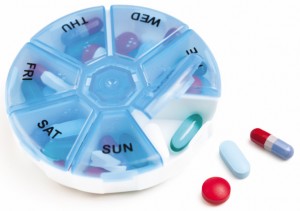 With a growing older adult population and increasing number of prescriptions available, the potential for medication safety problems is expanding. As people age, they may be prescribed more than one medication. This increases the risk for drug interactions and side effects. Age-related changes in the kidneys, liver and central nervous system also put seniors at increased risk for medication side effects.
With a growing older adult population and increasing number of prescriptions available, the potential for medication safety problems is expanding. As people age, they may be prescribed more than one medication. This increases the risk for drug interactions and side effects. Age-related changes in the kidneys, liver and central nervous system also put seniors at increased risk for medication side effects.
According to the Centers for Disease Control and Prevention (CDC), adverse drug events result in over 700,000 visits to hospital emergency rooms each year. Many adverse drug events can be prevented. All persons taking warfarin, blood thinners, insulin or oral diabetes medications are at high risk for hospitalizations.
The wise use of medications can greatly benefit older adults by reducing unnecessary hospitalizations, preventing premature death, as well as maintaining independence.
Are over-the-counter medications safe?
Nonprescription medications are convenient and many of these products can temporarily relieve minor conditions such as headaches, cold symptoms and indigestion. However; each year, seniors are hospitalized from problems related to nonprescription medications. Seniors need to check with their doctor first if it is OK to take a nonprescription medication.
What factors put seniors at high risk for medication problems?
- Living alone
- Taking three or more medications
- Memory problems
- Prescriptions from multiple doctors
- Filling prescriptions at multiple pharmacies
What safety tips are recommended for good medication management?
- Carry a list of medications at all times
- Bring all medications in a bag to every doctor visit
- Inform the doctor of over-the-counter medications
- Ask questions about the side effects
- Avoid alcohol
- Do not share medications with friends or family
- Read prescription labels and follow directions
- Report problems to the doctor
- Use a pillbox to hold medication for the week
- Dispose of medications that are expired or unwanted
For more information on properly disposing your unwanted drugs, call the State Narcotics Enforcement Division at 808-837-8470 and ask about the Hawai‘i Medication Take-Back Program. This program takes place about four times a year in various communities. Check online at www.dea.gov for a list of take-back locations. Also, you may read about it more in Generations Magazine’s 2014 April/May issue.


Leave a Reply